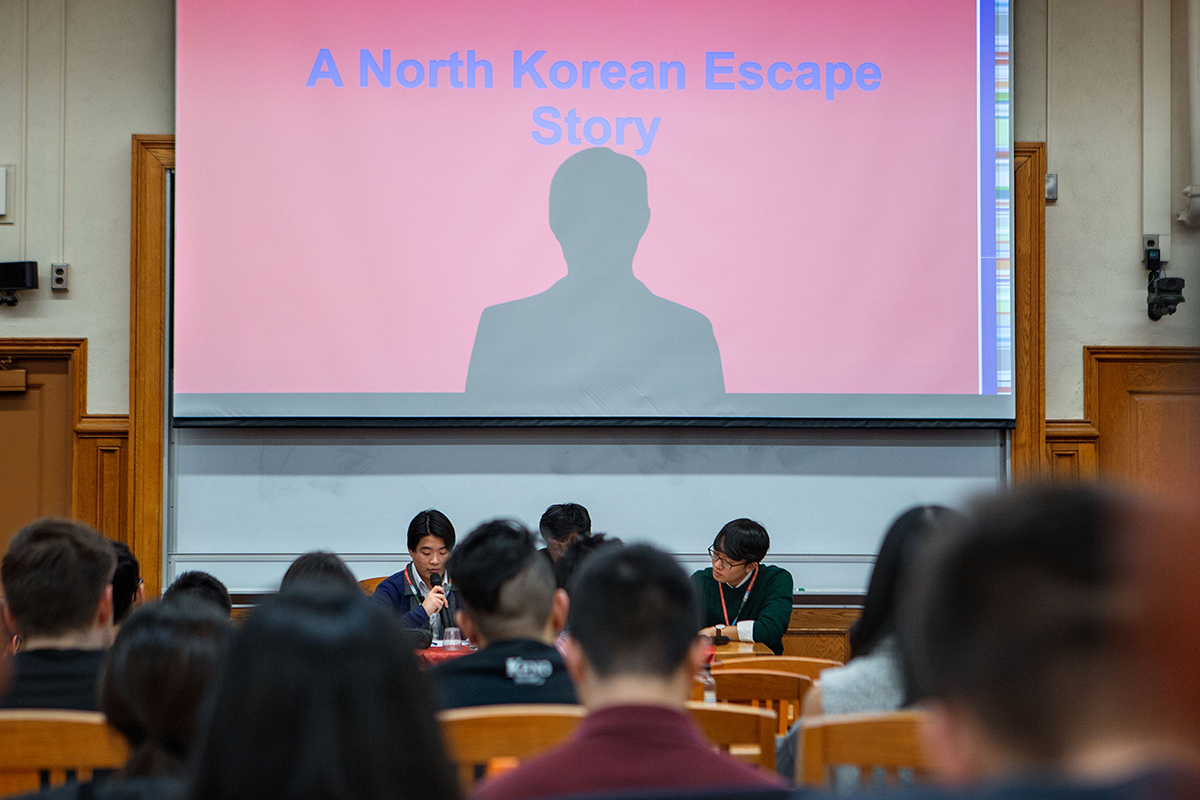North Korean escapee lifts the veil on his closed nation
By Robert Johnson

In this age of extensive global commerce, mass surveillance and social networking, few countries in the world have maintained the type of enigmatic character often attributed to North Korea.
On Feb. 16, a standing-room crowd in Myron Taylor Hall was given a glimpse of North Korean life when defector “Mr. Kim” told about his life and escape to the United States. His talk opened the Cornell International Law Journal’s 2017 Symposium.
Born in 1967 in the southern city of Haeju, Kim attended medical school and practiced as a licensed physician before leaving the profession to become a businessman in the fishing industry.
Explaining his rationale for the career change, Kim said that because of the economic and political structures in North Korea, doctors there face very different realities than in the U.S. Medical supplies received by the country were distributed to the military and “higher classes” first, and public hospitals received the leftovers, he said; the hospitals routinely faced medical supply shortages, creating highly stressful situations for doctors and patients.
Life as a businessman was generally more comfortable, Kim said, explaining that North Korea began its first steps toward capitalistic development in 2001 when it allowed citizens to operate their own businesses. This change in policy only applied to urban areas, however. Outside of cities, people had to rely on subsistence farming.
In Kim’s view, the introduction of businesses in urban areas led to a decline in sympathy for poor and homeless persons. He recalled several stories of harsh penalties for those accused of thievery, ranging from the search and seizure of personal property to arrest and detainment in remote forced-labor camps. Those suspected of other crimes, such as drug abuse or disobeying traffic laws, were subject to being shot by police.
Kim told of one incident in which he and his daughter were arrested and detained by police in Pyongyang, the capital city, for wearing dirty clothes (thus appearing to be thieves). During their captivity, they were made to do “strenuous physical activities” and recite the rules of the prison, he said.
The threat of property seizures or arrest and detainment without due process was described as a consistent feature of life in North Korea, tied to the government’s efforts to enforce its economic and social structures.
For example, the ability to choose one’s livelihood is a right not shared by all North Koreans, Kim said: “The sons and daughters of people engaged in hard jobs are forced to inherit these jobs. Freedom to choose work is only given to those of high class and urban residents.”
He continued: “Every city and county has a center dedicated to investigating people who do not show up to work or who do not work hard. If convicted, those people can be arrested and forced to do hard labor for six months.”
After the death of his parents, Kim began his defection from North Korea with his daughter in 2009. He liquidated all of his assets and traveled north to the Chinese border. From China, Kim and his family traveled to Thailand and then to the U.S. in 2013.
Aside from the language barrier, Kim says that adjusting to the capitalist culture of the United States has been one of the biggest challenges he has faced thus far. Looking forward, he expressed his hope that the North Korean government “will not harass its citizens as much” and that South Korea and the U.S. will continue to support him and other defectors seeking to share their stories.
Robert Johnson ‘17 is a writer intern for the Cornell Chronicle.
Media Contact
Get Cornell news delivered right to your inbox.
Subscribe